Communication Skills: Listening, Feedback, Questioning Essay
VerifiedAdded on 2020/04/07
|6
|1784
|53
Essay
AI Summary
This essay explores the critical role of communication skills in professional settings, specifically focusing on listening, feedback, and questioning. It defines these three interpersonal communication skills and emphasizes their significance in achieving professional success and development. The essay highlights the importance of effective communication for occupational health and safety officers, who rely on these skills to monitor and control workplace risks and hazards. It discusses how active listening, timely feedback, and effective questioning are crucial for gathering information, guiding organizations, and ensuring compliance with health and safety policies. The essay also explains how the integration of these skills helps in conveying information, obtaining stakeholder views, and providing guidance on workplace safety measures. It concludes by reiterating the importance of these skills for occupational health and safety officers to advise management properly and prevent communication breakdowns.
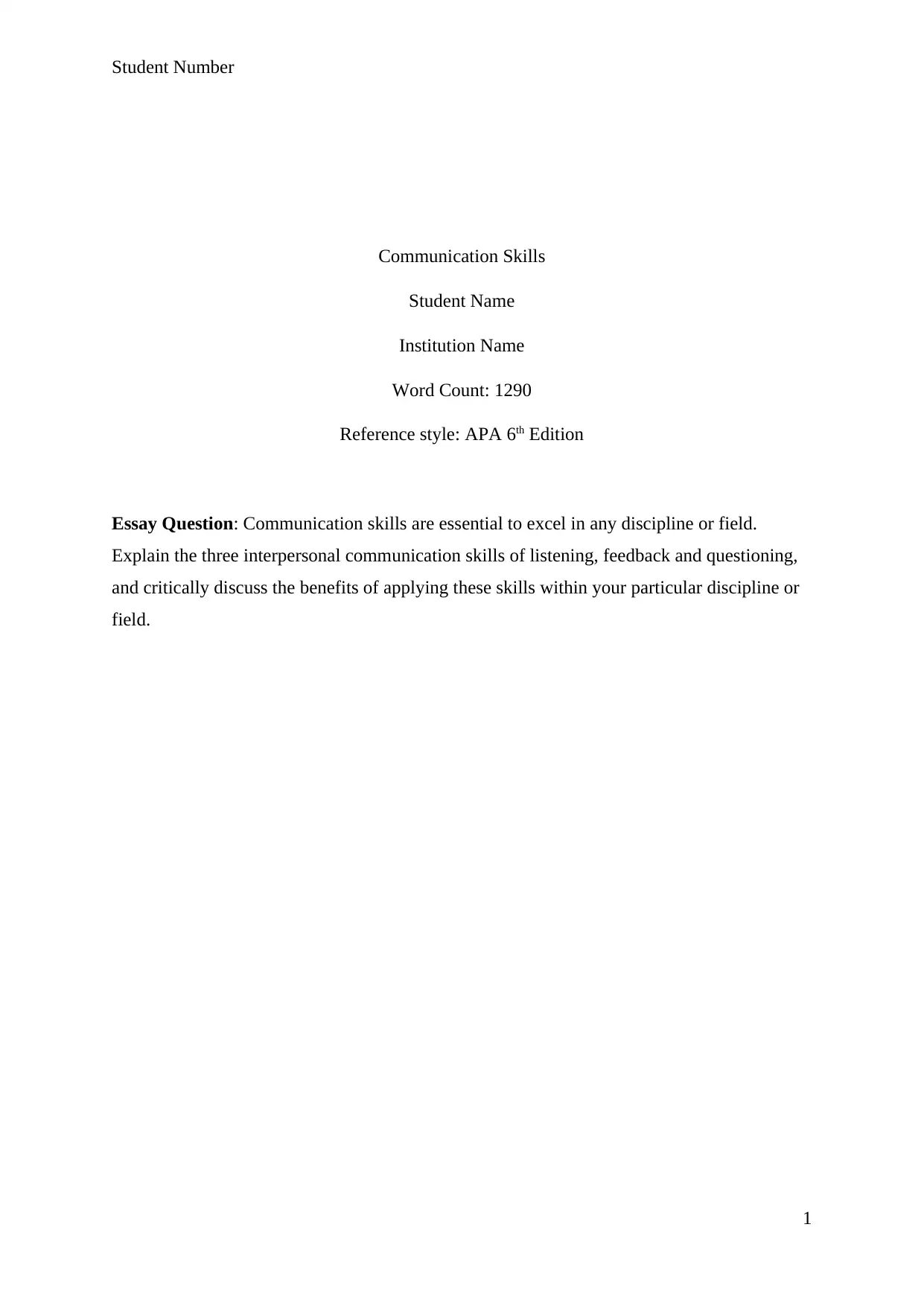
Student Number
Communication Skills
Student Name
Institution Name
Word Count: 1290
Reference style: APA 6th Edition
Essay Question: Communication skills are essential to excel in any discipline or field.
Explain the three interpersonal communication skills of listening, feedback and questioning,
and critically discuss the benefits of applying these skills within your particular discipline or
field.
1
Communication Skills
Student Name
Institution Name
Word Count: 1290
Reference style: APA 6th Edition
Essay Question: Communication skills are essential to excel in any discipline or field.
Explain the three interpersonal communication skills of listening, feedback and questioning,
and critically discuss the benefits of applying these skills within your particular discipline or
field.
1
Paraphrase This Document
Need a fresh take? Get an instant paraphrase of this document with our AI Paraphraser
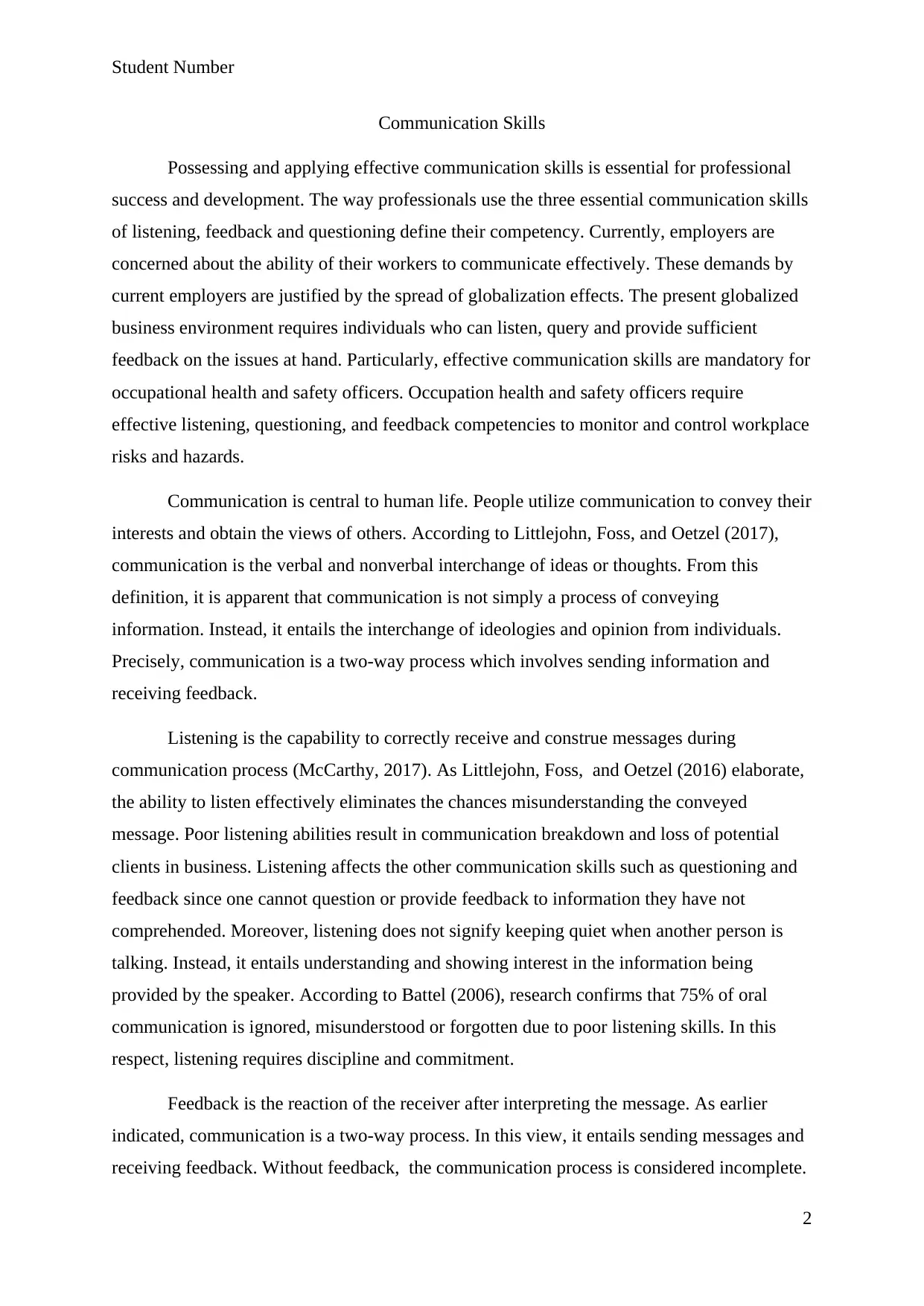
Student Number
Communication Skills
Possessing and applying effective communication skills is essential for professional
success and development. The way professionals use the three essential communication skills
of listening, feedback and questioning define their competency. Currently, employers are
concerned about the ability of their workers to communicate effectively. These demands by
current employers are justified by the spread of globalization effects. The present globalized
business environment requires individuals who can listen, query and provide sufficient
feedback on the issues at hand. Particularly, effective communication skills are mandatory for
occupational health and safety officers. Occupation health and safety officers require
effective listening, questioning, and feedback competencies to monitor and control workplace
risks and hazards.
Communication is central to human life. People utilize communication to convey their
interests and obtain the views of others. According to Littlejohn, Foss, and Oetzel (2017),
communication is the verbal and nonverbal interchange of ideas or thoughts. From this
definition, it is apparent that communication is not simply a process of conveying
information. Instead, it entails the interchange of ideologies and opinion from individuals.
Precisely, communication is a two-way process which involves sending information and
receiving feedback.
Listening is the capability to correctly receive and construe messages during
communication process (McCarthy, 2017). As Littlejohn, Foss, and Oetzel (2016) elaborate,
the ability to listen effectively eliminates the chances misunderstanding the conveyed
message. Poor listening abilities result in communication breakdown and loss of potential
clients in business. Listening affects the other communication skills such as questioning and
feedback since one cannot question or provide feedback to information they have not
comprehended. Moreover, listening does not signify keeping quiet when another person is
talking. Instead, it entails understanding and showing interest in the information being
provided by the speaker. According to Battel (2006), research confirms that 75% of oral
communication is ignored, misunderstood or forgotten due to poor listening skills. In this
respect, listening requires discipline and commitment.
Feedback is the reaction of the receiver after interpreting the message. As earlier
indicated, communication is a two-way process. In this view, it entails sending messages and
receiving feedback. Without feedback, the communication process is considered incomplete.
2
Communication Skills
Possessing and applying effective communication skills is essential for professional
success and development. The way professionals use the three essential communication skills
of listening, feedback and questioning define their competency. Currently, employers are
concerned about the ability of their workers to communicate effectively. These demands by
current employers are justified by the spread of globalization effects. The present globalized
business environment requires individuals who can listen, query and provide sufficient
feedback on the issues at hand. Particularly, effective communication skills are mandatory for
occupational health and safety officers. Occupation health and safety officers require
effective listening, questioning, and feedback competencies to monitor and control workplace
risks and hazards.
Communication is central to human life. People utilize communication to convey their
interests and obtain the views of others. According to Littlejohn, Foss, and Oetzel (2017),
communication is the verbal and nonverbal interchange of ideas or thoughts. From this
definition, it is apparent that communication is not simply a process of conveying
information. Instead, it entails the interchange of ideologies and opinion from individuals.
Precisely, communication is a two-way process which involves sending information and
receiving feedback.
Listening is the capability to correctly receive and construe messages during
communication process (McCarthy, 2017). As Littlejohn, Foss, and Oetzel (2016) elaborate,
the ability to listen effectively eliminates the chances misunderstanding the conveyed
message. Poor listening abilities result in communication breakdown and loss of potential
clients in business. Listening affects the other communication skills such as questioning and
feedback since one cannot question or provide feedback to information they have not
comprehended. Moreover, listening does not signify keeping quiet when another person is
talking. Instead, it entails understanding and showing interest in the information being
provided by the speaker. According to Battel (2006), research confirms that 75% of oral
communication is ignored, misunderstood or forgotten due to poor listening skills. In this
respect, listening requires discipline and commitment.
Feedback is the reaction of the receiver after interpreting the message. As earlier
indicated, communication is a two-way process. In this view, it entails sending messages and
receiving feedback. Without feedback, the communication process is considered incomplete.
2
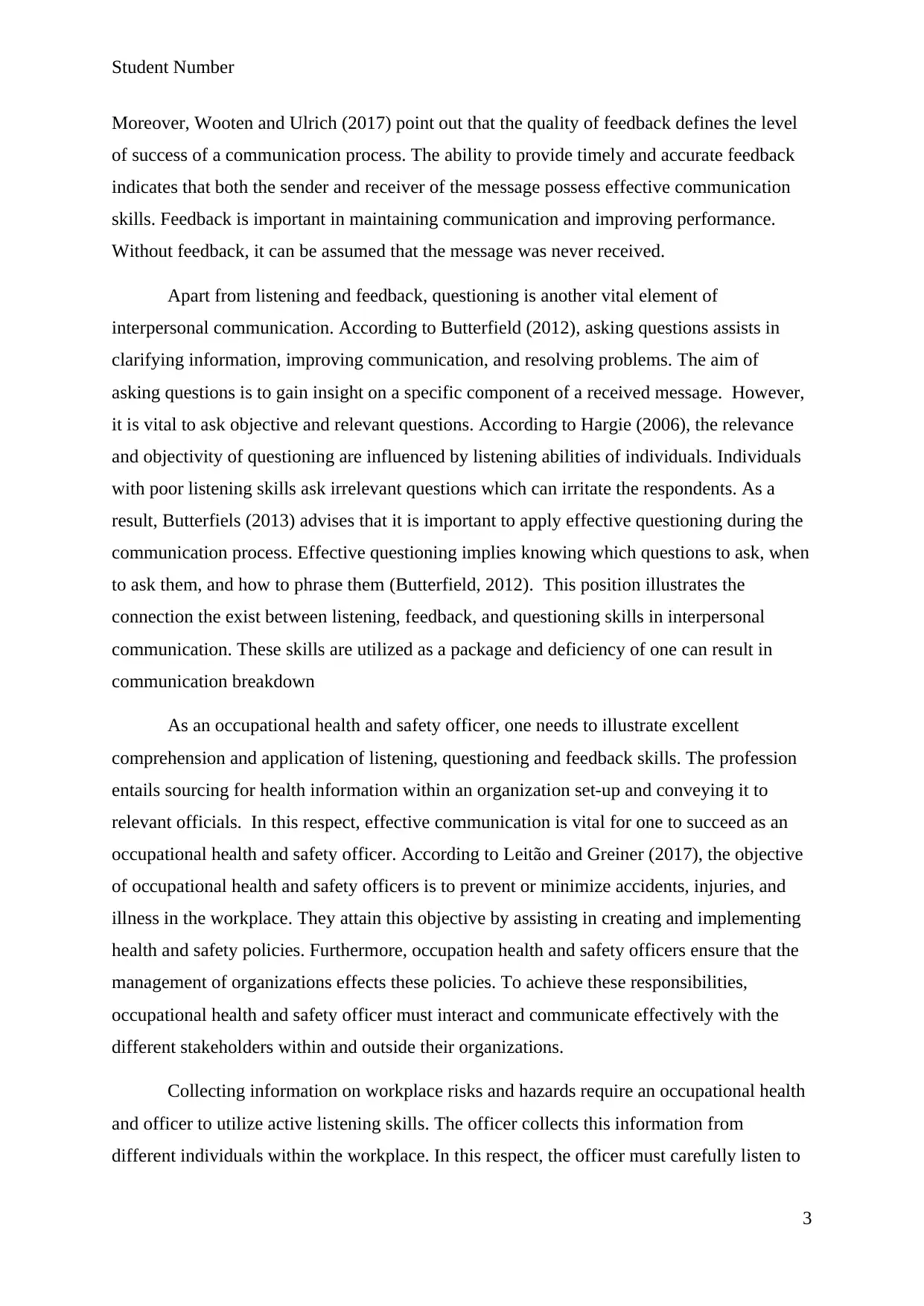
Student Number
Moreover, Wooten and Ulrich (2017) point out that the quality of feedback defines the level
of success of a communication process. The ability to provide timely and accurate feedback
indicates that both the sender and receiver of the message possess effective communication
skills. Feedback is important in maintaining communication and improving performance.
Without feedback, it can be assumed that the message was never received.
Apart from listening and feedback, questioning is another vital element of
interpersonal communication. According to Butterfield (2012), asking questions assists in
clarifying information, improving communication, and resolving problems. The aim of
asking questions is to gain insight on a specific component of a received message. However,
it is vital to ask objective and relevant questions. According to Hargie (2006), the relevance
and objectivity of questioning are influenced by listening abilities of individuals. Individuals
with poor listening skills ask irrelevant questions which can irritate the respondents. As a
result, Butterfiels (2013) advises that it is important to apply effective questioning during the
communication process. Effective questioning implies knowing which questions to ask, when
to ask them, and how to phrase them (Butterfield, 2012). This position illustrates the
connection the exist between listening, feedback, and questioning skills in interpersonal
communication. These skills are utilized as a package and deficiency of one can result in
communication breakdown
As an occupational health and safety officer, one needs to illustrate excellent
comprehension and application of listening, questioning and feedback skills. The profession
entails sourcing for health information within an organization set-up and conveying it to
relevant officials. In this respect, effective communication is vital for one to succeed as an
occupational health and safety officer. According to Leitão and Greiner (2017), the objective
of occupational health and safety officers is to prevent or minimize accidents, injuries, and
illness in the workplace. They attain this objective by assisting in creating and implementing
health and safety policies. Furthermore, occupation health and safety officers ensure that the
management of organizations effects these policies. To achieve these responsibilities,
occupational health and safety officer must interact and communicate effectively with the
different stakeholders within and outside their organizations.
Collecting information on workplace risks and hazards require an occupational health
and officer to utilize active listening skills. The officer collects this information from
different individuals within the workplace. In this respect, the officer must carefully listen to
3
Moreover, Wooten and Ulrich (2017) point out that the quality of feedback defines the level
of success of a communication process. The ability to provide timely and accurate feedback
indicates that both the sender and receiver of the message possess effective communication
skills. Feedback is important in maintaining communication and improving performance.
Without feedback, it can be assumed that the message was never received.
Apart from listening and feedback, questioning is another vital element of
interpersonal communication. According to Butterfield (2012), asking questions assists in
clarifying information, improving communication, and resolving problems. The aim of
asking questions is to gain insight on a specific component of a received message. However,
it is vital to ask objective and relevant questions. According to Hargie (2006), the relevance
and objectivity of questioning are influenced by listening abilities of individuals. Individuals
with poor listening skills ask irrelevant questions which can irritate the respondents. As a
result, Butterfiels (2013) advises that it is important to apply effective questioning during the
communication process. Effective questioning implies knowing which questions to ask, when
to ask them, and how to phrase them (Butterfield, 2012). This position illustrates the
connection the exist between listening, feedback, and questioning skills in interpersonal
communication. These skills are utilized as a package and deficiency of one can result in
communication breakdown
As an occupational health and safety officer, one needs to illustrate excellent
comprehension and application of listening, questioning and feedback skills. The profession
entails sourcing for health information within an organization set-up and conveying it to
relevant officials. In this respect, effective communication is vital for one to succeed as an
occupational health and safety officer. According to Leitão and Greiner (2017), the objective
of occupational health and safety officers is to prevent or minimize accidents, injuries, and
illness in the workplace. They attain this objective by assisting in creating and implementing
health and safety policies. Furthermore, occupation health and safety officers ensure that the
management of organizations effects these policies. To achieve these responsibilities,
occupational health and safety officer must interact and communicate effectively with the
different stakeholders within and outside their organizations.
Collecting information on workplace risks and hazards require an occupational health
and officer to utilize active listening skills. The officer collects this information from
different individuals within the workplace. In this respect, the officer must carefully listen to
3
⊘ This is a preview!⊘
Do you want full access?
Subscribe today to unlock all pages.

Trusted by 1+ million students worldwide
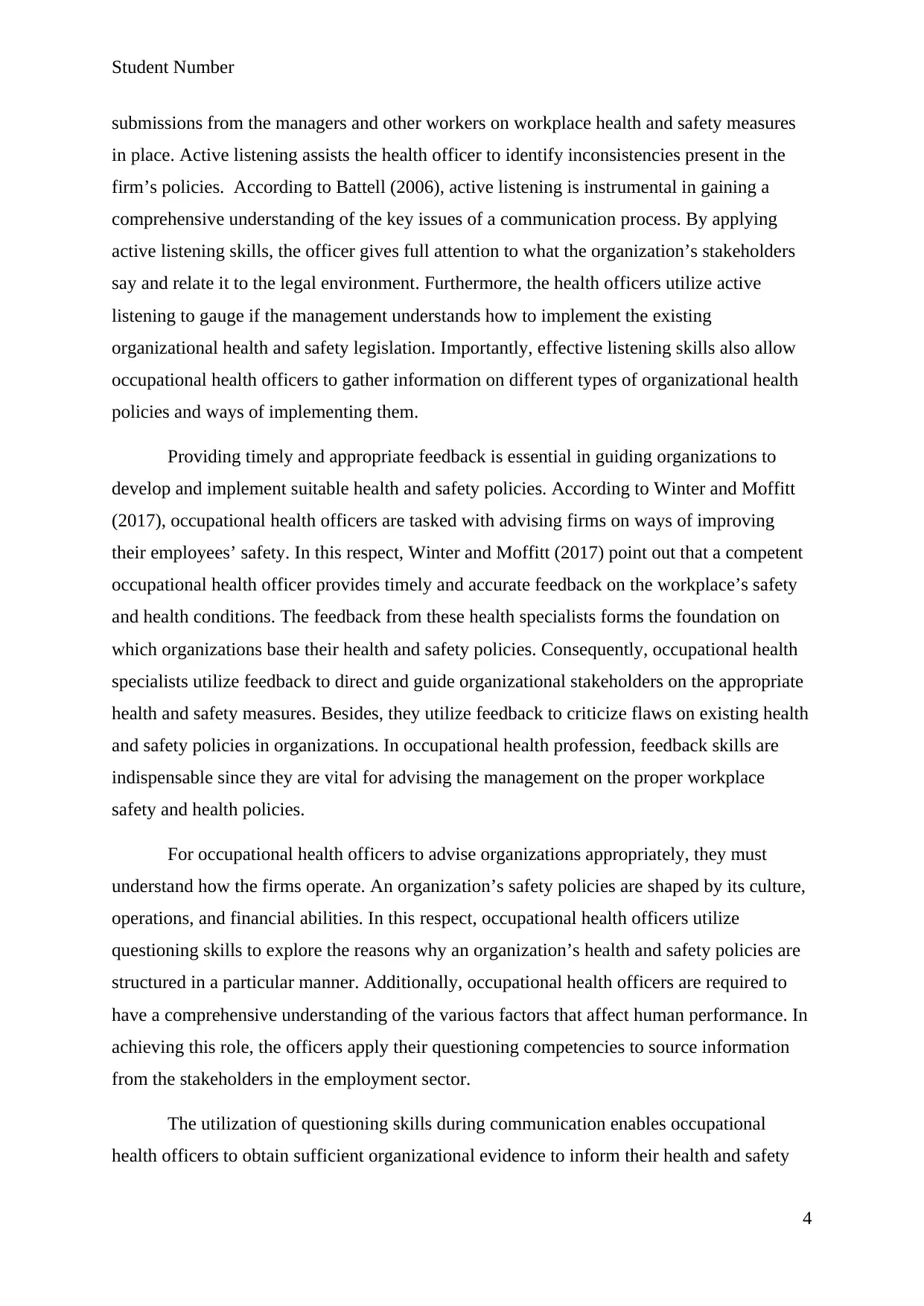
Student Number
submissions from the managers and other workers on workplace health and safety measures
in place. Active listening assists the health officer to identify inconsistencies present in the
firm’s policies. According to Battell (2006), active listening is instrumental in gaining a
comprehensive understanding of the key issues of a communication process. By applying
active listening skills, the officer gives full attention to what the organization’s stakeholders
say and relate it to the legal environment. Furthermore, the health officers utilize active
listening to gauge if the management understands how to implement the existing
organizational health and safety legislation. Importantly, effective listening skills also allow
occupational health officers to gather information on different types of organizational health
policies and ways of implementing them.
Providing timely and appropriate feedback is essential in guiding organizations to
develop and implement suitable health and safety policies. According to Winter and Moffitt
(2017), occupational health officers are tasked with advising firms on ways of improving
their employees’ safety. In this respect, Winter and Moffitt (2017) point out that a competent
occupational health officer provides timely and accurate feedback on the workplace’s safety
and health conditions. The feedback from these health specialists forms the foundation on
which organizations base their health and safety policies. Consequently, occupational health
specialists utilize feedback to direct and guide organizational stakeholders on the appropriate
health and safety measures. Besides, they utilize feedback to criticize flaws on existing health
and safety policies in organizations. In occupational health profession, feedback skills are
indispensable since they are vital for advising the management on the proper workplace
safety and health policies.
For occupational health officers to advise organizations appropriately, they must
understand how the firms operate. An organization’s safety policies are shaped by its culture,
operations, and financial abilities. In this respect, occupational health officers utilize
questioning skills to explore the reasons why an organization’s health and safety policies are
structured in a particular manner. Additionally, occupational health officers are required to
have a comprehensive understanding of the various factors that affect human performance. In
achieving this role, the officers apply their questioning competencies to source information
from the stakeholders in the employment sector.
The utilization of questioning skills during communication enables occupational
health officers to obtain sufficient organizational evidence to inform their health and safety
4
submissions from the managers and other workers on workplace health and safety measures
in place. Active listening assists the health officer to identify inconsistencies present in the
firm’s policies. According to Battell (2006), active listening is instrumental in gaining a
comprehensive understanding of the key issues of a communication process. By applying
active listening skills, the officer gives full attention to what the organization’s stakeholders
say and relate it to the legal environment. Furthermore, the health officers utilize active
listening to gauge if the management understands how to implement the existing
organizational health and safety legislation. Importantly, effective listening skills also allow
occupational health officers to gather information on different types of organizational health
policies and ways of implementing them.
Providing timely and appropriate feedback is essential in guiding organizations to
develop and implement suitable health and safety policies. According to Winter and Moffitt
(2017), occupational health officers are tasked with advising firms on ways of improving
their employees’ safety. In this respect, Winter and Moffitt (2017) point out that a competent
occupational health officer provides timely and accurate feedback on the workplace’s safety
and health conditions. The feedback from these health specialists forms the foundation on
which organizations base their health and safety policies. Consequently, occupational health
specialists utilize feedback to direct and guide organizational stakeholders on the appropriate
health and safety measures. Besides, they utilize feedback to criticize flaws on existing health
and safety policies in organizations. In occupational health profession, feedback skills are
indispensable since they are vital for advising the management on the proper workplace
safety and health policies.
For occupational health officers to advise organizations appropriately, they must
understand how the firms operate. An organization’s safety policies are shaped by its culture,
operations, and financial abilities. In this respect, occupational health officers utilize
questioning skills to explore the reasons why an organization’s health and safety policies are
structured in a particular manner. Additionally, occupational health officers are required to
have a comprehensive understanding of the various factors that affect human performance. In
achieving this role, the officers apply their questioning competencies to source information
from the stakeholders in the employment sector.
The utilization of questioning skills during communication enables occupational
health officers to obtain sufficient organizational evidence to inform their health and safety
4
Paraphrase This Document
Need a fresh take? Get an instant paraphrase of this document with our AI Paraphraser
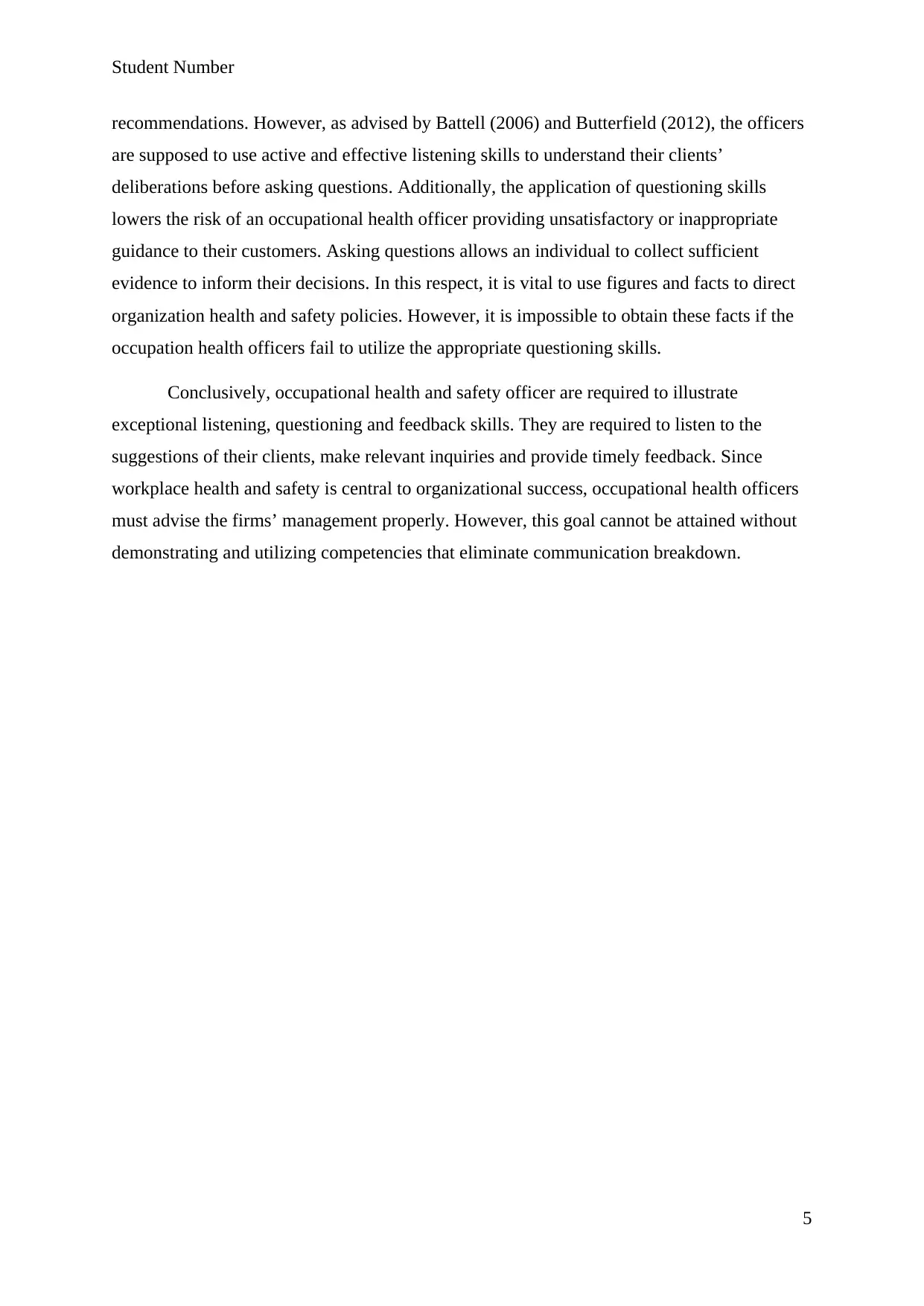
Student Number
recommendations. However, as advised by Battell (2006) and Butterfield (2012), the officers
are supposed to use active and effective listening skills to understand their clients’
deliberations before asking questions. Additionally, the application of questioning skills
lowers the risk of an occupational health officer providing unsatisfactory or inappropriate
guidance to their customers. Asking questions allows an individual to collect sufficient
evidence to inform their decisions. In this respect, it is vital to use figures and facts to direct
organization health and safety policies. However, it is impossible to obtain these facts if the
occupation health officers fail to utilize the appropriate questioning skills.
Conclusively, occupational health and safety officer are required to illustrate
exceptional listening, questioning and feedback skills. They are required to listen to the
suggestions of their clients, make relevant inquiries and provide timely feedback. Since
workplace health and safety is central to organizational success, occupational health officers
must advise the firms’ management properly. However, this goal cannot be attained without
demonstrating and utilizing competencies that eliminate communication breakdown.
5
recommendations. However, as advised by Battell (2006) and Butterfield (2012), the officers
are supposed to use active and effective listening skills to understand their clients’
deliberations before asking questions. Additionally, the application of questioning skills
lowers the risk of an occupational health officer providing unsatisfactory or inappropriate
guidance to their customers. Asking questions allows an individual to collect sufficient
evidence to inform their decisions. In this respect, it is vital to use figures and facts to direct
organization health and safety policies. However, it is impossible to obtain these facts if the
occupation health officers fail to utilize the appropriate questioning skills.
Conclusively, occupational health and safety officer are required to illustrate
exceptional listening, questioning and feedback skills. They are required to listen to the
suggestions of their clients, make relevant inquiries and provide timely feedback. Since
workplace health and safety is central to organizational success, occupational health officers
must advise the firms’ management properly. However, this goal cannot be attained without
demonstrating and utilizing competencies that eliminate communication breakdown.
5
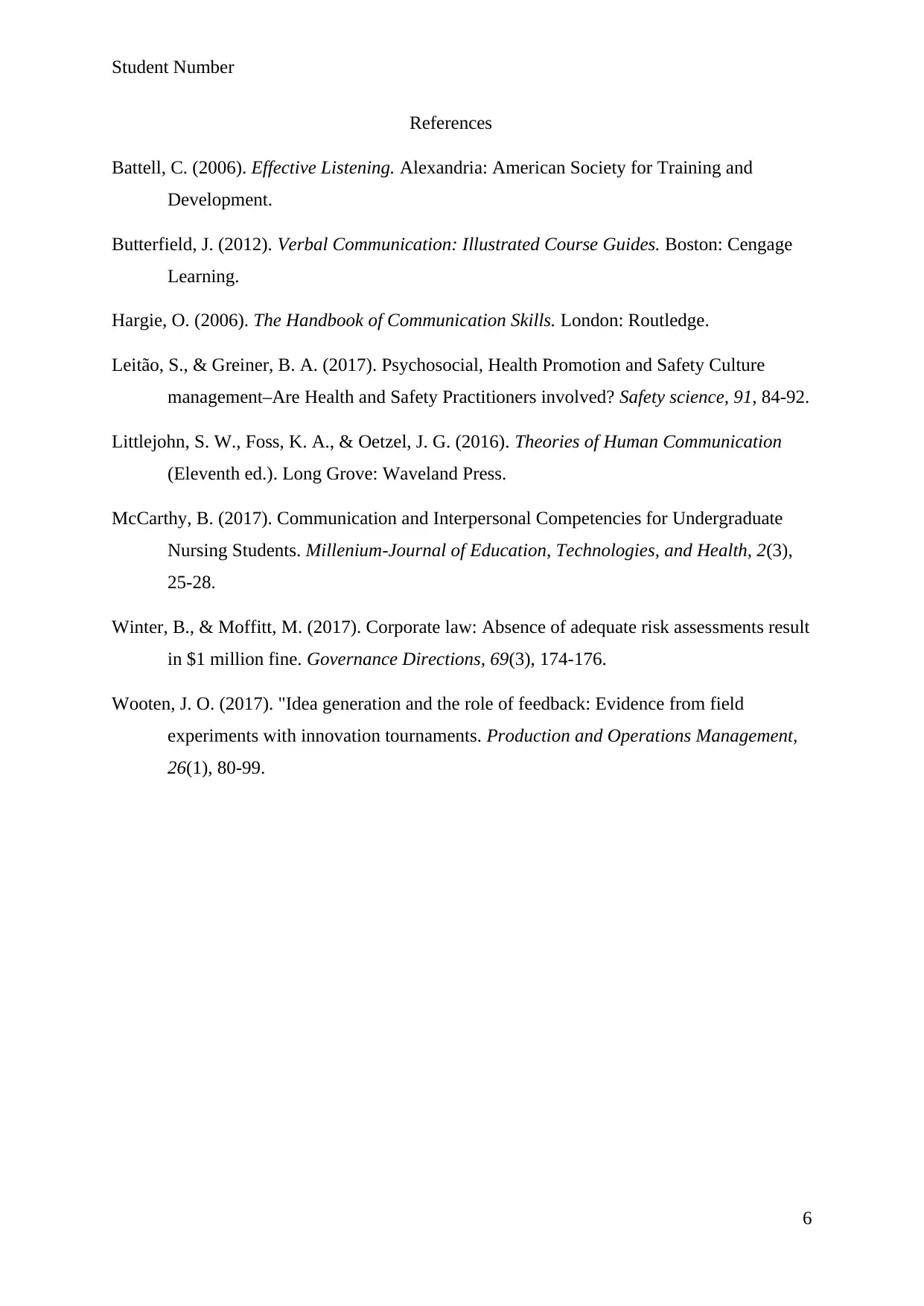
Student Number
References
Battell, C. (2006). Effective Listening. Alexandria: American Society for Training and
Development.
Butterfield, J. (2012). Verbal Communication: Illustrated Course Guides. Boston: Cengage
Learning.
Hargie, O. (2006). The Handbook of Communication Skills. London: Routledge.
Leitão, S., & Greiner, B. A. (2017). Psychosocial, Health Promotion and Safety Culture
management–Are Health and Safety Practitioners involved? Safety science, 91, 84-92.
Littlejohn, S. W., Foss, K. A., & Oetzel, J. G. (2016). Theories of Human Communication
(Eleventh ed.). Long Grove: Waveland Press.
McCarthy, B. (2017). Communication and Interpersonal Competencies for Undergraduate
Nursing Students. Millenium-Journal of Education, Technologies, and Health, 2(3),
25-28.
Winter, B., & Moffitt, M. (2017). Corporate law: Absence of adequate risk assessments result
in $1 million fine. Governance Directions, 69(3), 174-176.
Wooten, J. O. (2017). "Idea generation and the role of feedback: Evidence from field
experiments with innovation tournaments. Production and Operations Management,
26(1), 80-99.
6
References
Battell, C. (2006). Effective Listening. Alexandria: American Society for Training and
Development.
Butterfield, J. (2012). Verbal Communication: Illustrated Course Guides. Boston: Cengage
Learning.
Hargie, O. (2006). The Handbook of Communication Skills. London: Routledge.
Leitão, S., & Greiner, B. A. (2017). Psychosocial, Health Promotion and Safety Culture
management–Are Health and Safety Practitioners involved? Safety science, 91, 84-92.
Littlejohn, S. W., Foss, K. A., & Oetzel, J. G. (2016). Theories of Human Communication
(Eleventh ed.). Long Grove: Waveland Press.
McCarthy, B. (2017). Communication and Interpersonal Competencies for Undergraduate
Nursing Students. Millenium-Journal of Education, Technologies, and Health, 2(3),
25-28.
Winter, B., & Moffitt, M. (2017). Corporate law: Absence of adequate risk assessments result
in $1 million fine. Governance Directions, 69(3), 174-176.
Wooten, J. O. (2017). "Idea generation and the role of feedback: Evidence from field
experiments with innovation tournaments. Production and Operations Management,
26(1), 80-99.
6
⊘ This is a preview!⊘
Do you want full access?
Subscribe today to unlock all pages.

Trusted by 1+ million students worldwide
1 out of 6
Related Documents
Your All-in-One AI-Powered Toolkit for Academic Success.
+13062052269
info@desklib.com
Available 24*7 on WhatsApp / Email
![[object Object]](/_next/static/media/star-bottom.7253800d.svg)
Unlock your academic potential
Copyright © 2020–2026 A2Z Services. All Rights Reserved. Developed and managed by ZUCOL.





